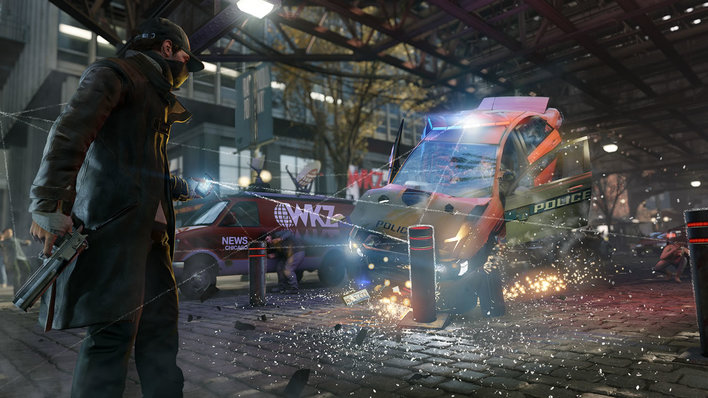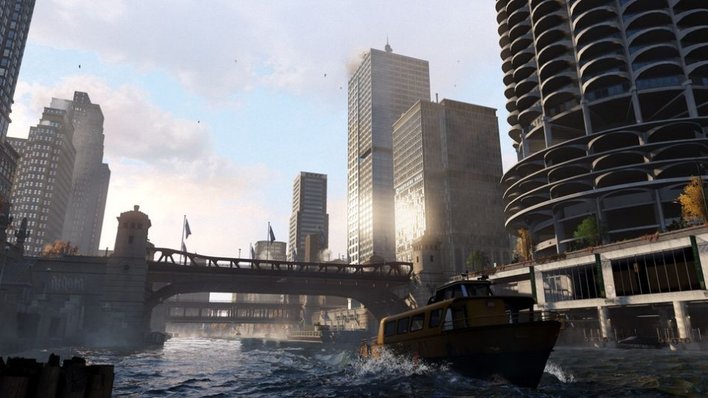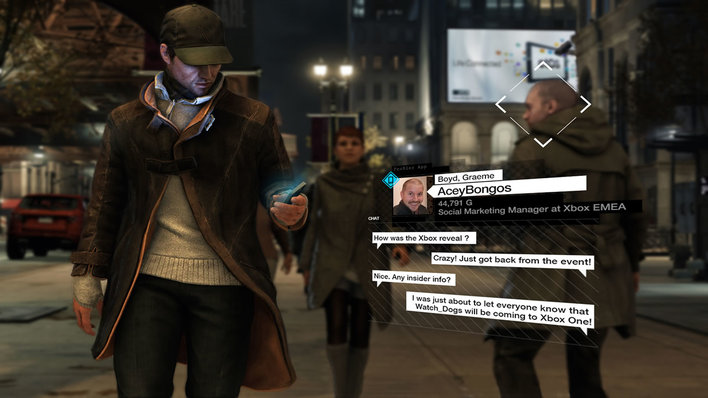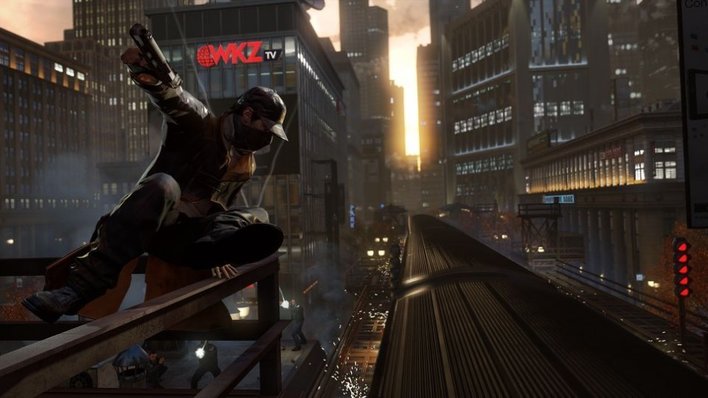Technology never ceases to amaze. We remember watching our parents' jaws drop the first time we beamed a photo from one phone to another via Bluetooth, the first time we accessed a computer remotely over the internet, and the first time we played a game online. Now barely a day goes by without a story about how something new and altogether pointless is controllable by your phone - your central heating, lights, flushing the toilet, or even your gran's rocking chair when she's half asleep. But even at the pace technology advances, we're probably a fair way off being able to control an entire city with your phone.
Yet that, in essence, is the story behind Watch Dogs, a game which puts you into the root directory of Aiden Pearce, a hacker in the middle of a near future Chicago, where everything is controlled by a giant computer system called ctOS (or "city OS" if you speak with a French accent. As the developers and publishers do.) Having found a back door into the system and installed it, as you do, as an app on his mobile phone, Aiden has a back door into anything in the city that comes under ctOS control, from traffic lights, to security cameras, lifting bridges, and even those little bollards that pop up to stop you going into roads.

Like that
But underneath the fancy hacking overlay, Watch Dogs is an open world game, with a city to explore. Like all games like this, that also means it needs a gripping story pushing you forward, giving you reason to care about the character you're playing as, and either plenty of drama, or humour to keep things moving along. Unfortunately, Watch Dogs offers neither, with a story that seems to plod along at a pace slower than a dial up modem, and perhaps the most generic character ever created in poster boy Aiden Pearce.
It's hard to really get behind Aiden, or even really know what drives him, because everything about him is clouded in secrecy - and what little details the game does let on aren't actually all that interesting. The game opens by showing you a cutscene where he and a friend hack into people's bank accounts in a posh hotel, stealing money from their unsuspecting victims. He's hardly a moral, upstanding citizen fighting against an oppressive Government, and yet he's a character you're supposed to sympathise with. Hey, they probably didn't need the money anyway, right?
A perennial loner, he doesn't have a wife or kids, so the game adds in a sister, niece and nephew to be kidnapped/threatened whenever the story demands. And yet even when the game's antagonist comes hunting for revenge after the hotel lobby hacking incident, and heads straight after the only weakness Aiden has - his family - it's kind of hard to feel sorry for Aiden. If anything, you just think he's a bit of a prat for having put his family in jeopardy in the first place.
Yet, sadly, this isn't just confined to Aiden - almost everyone in Watch Dogs is a two bit, wooden character with no depth, personality, or humanity - and that means the game has to rely on its gameplay alone. And for Watch Dogs, despite being a super hacker with an entire city at your fingertips, that's where it all starts to feel like a let down.

Pretty water, mind. And you can drive the boats, too.
When we first heard about Watch Dogs, we had a bad feeling it'd all turn out to be too good to be true. Being able to control almost everything about the city sounds good on paper, but despite wracking our brains, we could only think of a handful of ways it might come in useful. As it turns out, despite having connected far more things to computers than were actually necessary in the game, there isn't actually all that much you can do with your phenomenal hacking powers - and some of the things you can do aren't as good as they should be.
In the game, basically anything electric is under your command (although oddly enough, not street lights). You can hack traffic lights to turn their lights from red to green, at which point all the cars will accelerate at Mach 5 into the centre and smash into each other, rather than cautiously pulling forward. You can lift folding bridges in the city, which should make for a never-ending highlight reel of amazing car chase moments - but the bridges don't actually lift high enough, making it almost impossible for a car to fall down the middle, even when the bridge is fully lifted - so really, what's the point? Beyond the lights and bridges, you can blow up steam pipes under the ground, detonate electric boxes, and, once you've levelled your character high enough, cause blackouts across the city, but there's a rather limited selection on offer that don't really serve that much of a purpose in game, beyond getting the cops off your tail. And even then, they don't work that well.
And then there's the profiling. Whipping your phone out on the street and pushing a button lets you make use of your phone's nifty facial recognition technology to get information on anyone you see. Giving you three or four words about the randomers' deepest darkest secrets, it's an idea that helps the game's civilians feel a bit more human, but one that can lead to some rather odd results. One of the main problems is that you can only get access to this data when you're either totally stopped in your car, or on foot - and seeing as this is an open world game, and you'll spend the majority of it in a car because of the huge distances you need to travel, you don't really get to use it as much as you should. When profiling and hacking people is the only way to unlock some missions, most of the game's music, and is the easiest way to get some of its vehicles (not to mention being the main push of the game), it feels like a bit of an oversight. Some of the description are a bit odd, too - there's an awful lot of very politically motivated people in Chicago, a lot of people with weird sexual fetishes, and a surprising number of people under 30 battling cancer.

Simply look at someone, and you'll find out a little bit more about them
As an open world game, you can approach Watch Dogs however you choose - if you fancy passing time in the city, there are a number of side missions and even random minigames on offer, or, if you want to move through the game's story, you can access the annoyingly labelled "campaign" (eurgh) missions to find out what happens to your anti hero next.
Side missions mostly see you disrupting criminal activity in the city, as despite being a criminal yourself, you're seemingly really a good guy at heart. While discovering these missions is supposed to be linked to you hacking random people as you stroll the city's streets, and coming across bits of information you really shouldn't, you tend to find the missions mostly pop up at random - and even then, they all seem rather similar. One type sees you stumble across some advanced warning of a crime that's about to go down, whether you've intercepted a text message, or tapped into a conversation. Being the lawful vigilante that you are, it's up to you to take matters into your own hands, and stop the crime from happening. But only if you stop it once it's actually started.
After reaching the crime target, the first thing you'll want to do is dive into cover and pull out your phone to get your bearings. If there's a camera nearby, you'll want to hack into that, as it'll give you a better vantage point without you having to leave your safe spot. Lying it wait, it's then up to you to scan people who walk past, until you come across someone who's tagged as either being a potential victim, or a potential robber. Once you've found them, you'd think you could act, but oddly enough, you have to actually sit, and wait for the person to actually be on the verge of carrying out the crime before you move in to disrupt it. See a crook go to mug someone, and if you wait too long, you'll let the criminal get away with it - but annoyingly enough, if you move in too quickly, even after having identified them, you'll scare them away, and despite having prevented the crime, and saved the innocent victim, you'll actually fail the mission. You may have prevented the crime, but you haven't prevented it in the right way, dammit!

Like Batman, just rubbish.
Instead, these side missions are mostly a question of timing, as you have to get your super hero crime busting spot on in order to intercept the crime as it's happening, before having to chase the crook down to dish out some sweet justice. The only problem is, the crooks are usually a heck of a lot faster than you - and again, if you kill them, you'll sometimes get into trouble, as despite using your initiative to solve the crime, you haven't done it in the right way. Not that there is a reliable right way. Despite the fact the game's loading screens tell you shoot at criminal's knees to take them out, these crooks will take three shots to the knee before promptly dying. Yet somehow, these missions still aren't quite as frustrating as the convoy interception missions, that sometimes see you having to take down (i.e. not kill) two bad guys, both armed with shotguns, and surrounded by a dozen heavily armed bodyguards. Sigh.
Thankfully, the story missions are more of a mixed bag. While most have a heavy emphasis on stealth, the way you have to put your hacking powers to the test varies from mission to mission - and some missions you can actually complete without firing a single shot. Having made your way into a compound, you can usually find yourself somewhere to hide, and then approach things almost as if it's a puzzle. Looking out for cameras to switch to, and jumping from one camera to the next (as you can hack security panels, other cameras, and various other bits and pieces from the cameras themselves) you can activate bits of machinery to lure the guards near - lift a forklift, set off a valve, or open a grate, before finding something you can overload and explode. Blow up a junction box, drop a crate, or even hack a guard's grenade, and you can take out the majority of the guards without moving from your hidey hole. At least, in some missions.
In others, you have very little choice but to get involved physically, picking off guards as and when you can, in a game that leaves its hacking behind and degenerates into a poor cover based shooter. Some missions ramp the stealth up further, but they aren't much better either. While you usually have a window of leeway when guards look at you, to give you a bit of warning and chance to scoot back into the shadows, in a mission set inside a prison, a guard even so much as spotting you once, for a split second means it's game over for you. When enemies can spot you perfectly from several storeys up, yet you can hardly see them at all through the grates and other obstacles, it's a long way from being fair.
So, while it may have an interesting concept, Watch Dogs seems to have fluffed its execution. With a nigh on non-existent story, hacking that involves basically pointing your cursor at something and pressing a button, and some poorly fleshed out characters, this is a generic cover based shooter that simply pretends it's so much more. And the problem is, it could have been. While a decent story would have gone some way to fixing its problems, adding a more in depth, more involved, more "realistic" feeling hacking system would have made this something much more memorable. An old PC game called Uplink (terribly cheesy trailer here) handled hacking brilliantly, and had you sending emails to people, bouncing your IP across servers around the world, employing password cracks, encrypting files, and deleting logs, all in a simulated computer system that made it actually feel like you were hacking. Not just pointing your phone at something and pressing a button.
If Watch Dogs had gone down that route, we could have had something genuinely different here. Instead, all we've got is a game whose marketing has done a good job of disguising how generic it is.
Format Reviewed: Playstation 4



















